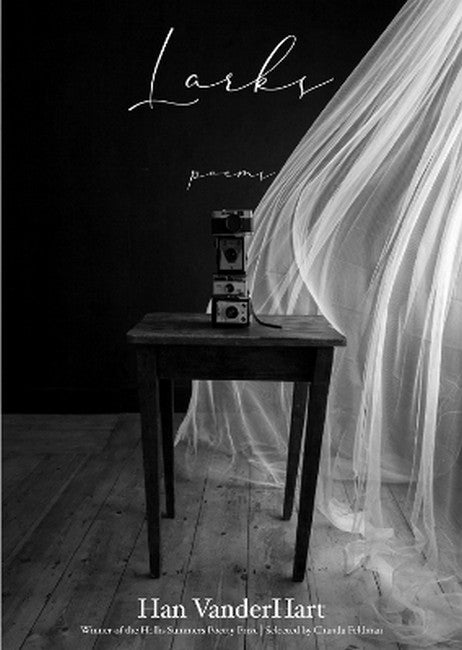Han VanderHart holds a PhD from Duke University and is the author of What Pecan Light (Bull City Press, 2021) and Hands Like Birds (Ethel Press, 2019). They have published in the Kenyon Review, the American Poetry Review, and AGNI. VanderHart also hosts the Of Poetry Podcast and coedits River River Books.
Request Academic Copy
Please copy the ISBN for submitting review copy form
Description
Han VanderHart's Larks is generous in its revelation of the lush, tremulous landscape of its making, where "the rain follows like a pet," the sumac flames, flowers of mildew bloom on the shower ceiling, and the speaker's hands are filled "with purple archangel and henbit." These poems are acutely aware of flowers and their naming; in fact, they catalog the world-barn kittens, birds, hauntings, pines, aspects of the color blue-but most importantly, the silences that toll within the family's split-level "house of no center," "that house of first rooms." VanderHart brilliantly fuses the realms of witness, incest, memory-"thin as eggshell"-trauma-induced obliviating, truth-telling, time-keeping, and the making of poems themselves-the silences that live where lines break, "the subjects / we leave to the end- / under a night sky, they skim like pelicans." Larks broadens into the territory of myth, at times reviving, but also banishing, the lethal habitual, replacing it with the poet's own vital, courageous inventions. "For each thing given to you, / make one thing up," they write. In Larks, Han VanderHart has demonstrated that survival is a profound act of the imagination. - Diane Seuss, Pulitzer Prize and National Book Critics Circle Award winner for frank: sonnets Larks heeds the calls of the world-whether that beckoning sounds like bird chatter, orchestral music on the radio, or voices around the dinner table. As the book unfolds, it disrupts the integrity of childhood memory filled with the song and sights of natural wonder, in order to let family silences begin to speak. The present blurs necessitating a reconsideration of the past, mythos, and family. Even as these poems craft moments of lyric and sonic beauty they learn to integrate anger and lament. The soft and patient voice of these poems makes these meditations all the more piercing. - Chanda Feldman, Hollis Summers Poetry Prize final judge and author of Approaching the Fields I warn you-Han VanderHart's Larks is a book of frightening beauty. Clusters of gorgeous images may ripen like dewberries there, trumpet vine and yellow jessamine may climb among its deft, balanced lines, but violence seethes among the wildflowers and loblolly pines. The ghosts of occult, unremembered memories haunt the pastures and barn, the house and the upstairs bedrooms. The poems may be set in the rural South, an insular world of family, farm, church, and home-school, a home where, the poet writes, "If you slammed a door/ too hard/...a rifle would fall/from the top/of the wooden buffet," but this book is no pastoral idyll. Honest to the bone, Larks is no frolic. I loved it. - Jennifer Atkinson, professor emerita, George Mason University Larks is not a book I needed to ponder or analyze. I felt it in my soul, immediately, intimately. I hope-with some confidence-that other readers will feel this as well, because no one makes it to adulthood completely unscathed. . . . The craft of VanderHart's poetry is exceptional. . . . And it is pleasure, ultimately, that repays the reading and re-reading of Larks. The book's alchemy is to turn grief and anguish into spacious, bright beauty. Read, and ascend. - Dana Delibovi (Cable Street)

